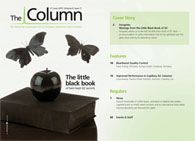International food safety training laboratory
Waters and the University of Maryland are establishing an international training laboratory to teach scientists from foreign governments and manufacturers the state-of-the-art analytical methods used to meet US food safety standards.
Waters and the University of Maryland are establishing an international training laboratory to teach scientists from foreign governments and manufacturers the state-of-the-art analytical methods used to meet US food safety standards.
It is reported that 15% of the US food supply comes from overseas. “Food safety issues are vital in today’s growing global marketplace,” said Senator John Kerry, chair of the senate committee on foreign relations. “The creation of the International Food Safety Training Laboratory will help protect consumers. By training scientists here at home and abroad, we can work together towards a common goal of an internationally sound food safety testing system.”
Waters has entered into a multi‑year commitment to fund the laboratory’s construction, provide analytical systems and assist the organizers in designing training programmes.
President C. D. Mote, Jr, of the University of Maryland, said that the university is very excited about this partnership. “This collaboration is a superb example of how the public and private sectors can maximize their impact by combining their strengths. The new programmes have excellent potential for improving food safety internationally.”
For more information on the collaboration visit www.jifsan.umd.edu/ and www.waters.com
This story originally appeared in The Column. Click here to view that issue.
Common Challenges in Nitrosamine Analysis: An LCGC International Peer Exchange
April 15th 2025A recent roundtable discussion featuring Aloka Srinivasan of Raaha, Mayank Bhanti of the United States Pharmacopeia (USP), and Amber Burch of Purisys discussed the challenges surrounding nitrosamine analysis in pharmaceuticals.
Extracting Estrogenic Hormones Using Rotating Disk and Modified Clays
April 14th 2025University of Caldas and University of Chile researchers extracted estrogenic hormones from wastewater samples using rotating disk sorption extraction. After extraction, the concentrated analytes were measured using liquid chromatography coupled with photodiode array detection (HPLC-PDA).











